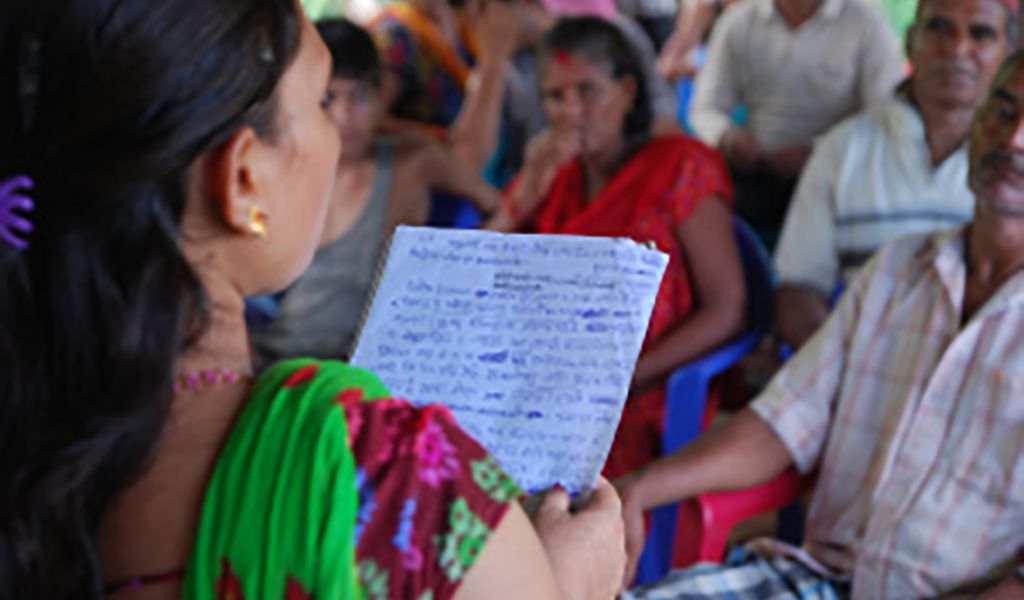The fifth IPCC report and local communities: Five reasons why we need to connect the dots

The Intergovernmental Panel on Climate Change (IPCC), a United Nations panel of climate experts, has struck an unfamiliar tone of aggressive urgency with the recent release of its Fifth Assessment Synthesis Report. The report issued stark warnings in the face of minimal action on climate change mitigation to date. According to the report, reducing emissions is crucial if global warming is to be limited to 2˚C . Failure to do so, the report found, could – and already has even – lead to food and water shortages, flooding of islands and cities, mass extinctions of plants and animals and climate refugee crises.
Although the report’s unusually stark language brings hope in the lead up to the pivotal international climate negotiations in Paris next year, the report leaves out an essential stakeholder: local communities. These communities will not only be most negatively impacted by climate change, but are essential actors in the success (or failure) of climate change mitigation efforts. Here are five reasons why local communities must be taken off the sidelines of climate change discussions and placed front and center:
- Local communities have clout in virtue of their numbers. Mitigation action must be taken now. Governments, however, have been hesitant to do so due to fears that this will antagonize powerful interests (typically in the energy production or associated sectors) and erode this political base. However, at least in theory, governments are accountable to their constituencies, and popular pressure (even in non-democratic countries) can be a powerful factor in shaping policy decisions. Grassroots communities are beginning to be seriously concerned about climate change (few things are as compelling as firsthand experience with climate related adversity, whether crop failure, natural disasters or an increasingly untenable living environment). Mobilizing local people, despite their limited (disaggregated) economic clout, will create necessary political pressure due to their clout in numbers, and may well serve as a compelling counterbalance to powerful economic interests.
- Local communities are on the front lines in suffering adverse climate change impacts, while urban populations and policymakers tend to be removed from the day-to-day realities of shifting seasons affecting crops, increasing water scarcity, changes in biodiversity due to ecological transitions and a diversity of related natural disasters. Local people have the most at stake in decisions policymakers make now (or fail to make) in reducing emissions. From both a practical and an ethical perspective, it is imperative that local people be involved in the decisions that will affect their future livelihoods.
- Land use change is a major source of emissions. Taken together, forestry and agriculture (the leading driver of deforestation) currently make up around 30% of global emissions according to the United States Environmental Protection Agency. Local people, and the national policies and regulatory frameworks that relate to their land use and most critically, their livelihoods, are key to reducing these emissions. Sustainable forest management and sustainable harvest, use and sale of forest products within an integrated landscape level approach, is necessary to reduce deforestation due to conversion for agriculture and commercial purposes. To coin a phrase: if the forest pays, it stays.
- Reducing deforestation is one of the most promising options for mitigation. Local people residing in and around forests are both one of the greatest potential allies in leveraging this mitigation option or one of the greatest obstacles, potentially de-railing it if their needs, interests and rights are neglected. Moreover, there are concerns about the potential erosion of local community and indigenous rights as market-based approaches to REDD+ (Reduced Emissions through Deforestation and forest Degradation) – the most promising mechanism for land-use based climate change mitigation – take shape. In order to optimize and safeguard the important role of organized local communities as valid stakeholders in rural landscapes, they must be recognized and empowered as architects in REDD+ design, implementation and monitoring.
- Mitigation is only half the battle in responding to climate change. If we succeed in absolutely halting emissions , even as soon as tomorrow, there will continue to be global warming for years to come, which will require adaptation to an increasing range and intensity of climate change impacts. Local communities are the canaries in the coal mines, both in providing insights into the impacts that the rest of the world will eventually experience, and in drawing upon traditional knowledge in pioneering innovative ways toward adapting to the impacts. Thus, local level experiences and strategies in adapting to climate change will (and should) necessarily re-orient the climate change discourse from international levels to a focus on local levels.
When UN Secretary-General Ban Ki-moon spoke to reporters at the release of the Fifth Assessment Synthesis Report in Copenhagen, he warned, “The science has spoken. There is no ambiguity in the message. Leaders must act now. Time is not on our side.” Alden Meyer, director of strategy and policy for the Union of Concerned Scientists made the point even more strongly, saying that the IPCC climate experts have given policymakers a clear choice: “either put policies in place to achieve this essential shift, or… spend the rest of [your] careers dealing with climate disaster after climate disaster.” An essential part of this policy shift requires an urgent and genuine engagement with local communities globally as key partners, and support for this critical stakeholder group to play its much needed role in climate change decision-making.
This piece was also later published by Outreach, a multi-stakeholder publication on climate change and sustainable development produced by Stakeholder Forum for a Sustainable Future.

